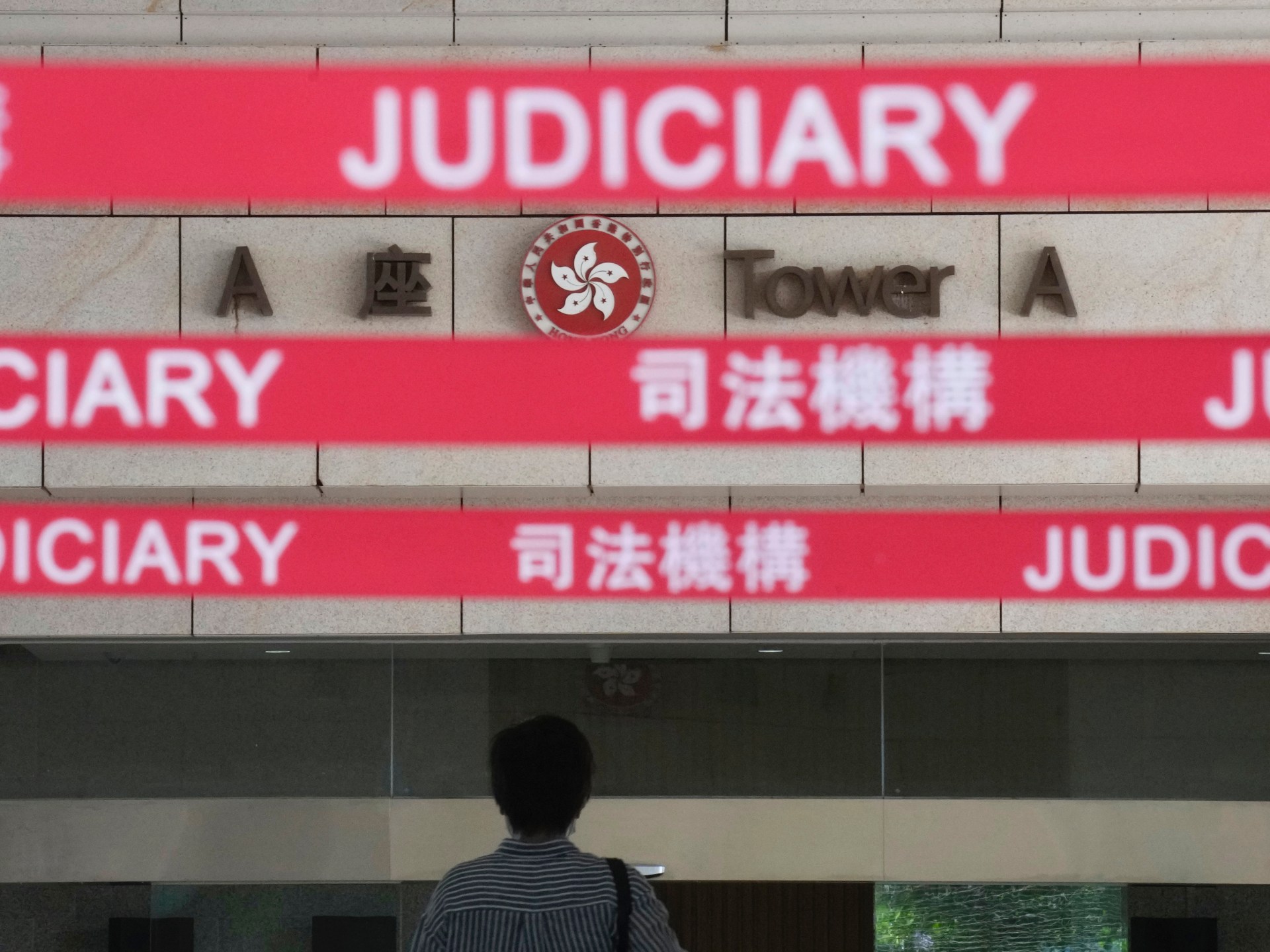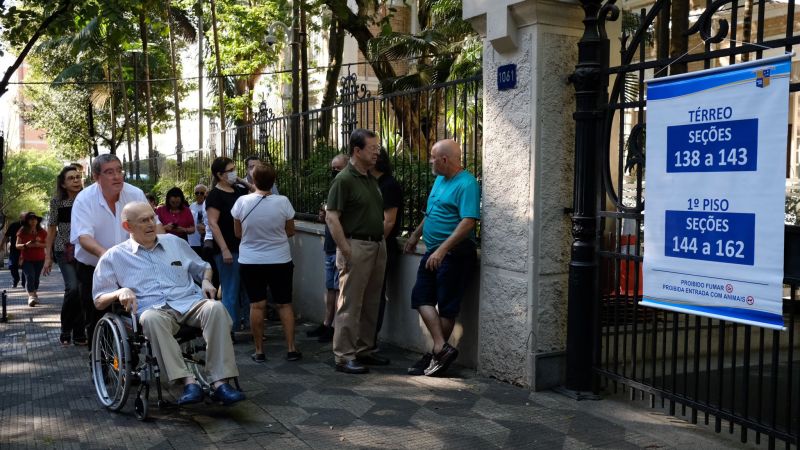‘We have one enemy’: The Belarusians who oppose the Ukraine war
Just before dawn on February 24, Marina, a 33-year-old IT specialist from Belarus, woke up in her Kraków apartment. She’d been having a nightmare.
She noticed that her husband, Alexey, was not sleeping either. He was on his phone, reading the news.
“Has it started?” Marina asked.
“It has,” he responded wearily.
That day at work, Marina could not focus. Her hands shook. “I felt sheer horror. I could not work, I could not do anything at all,” she says.
The young couple had moved to the Polish city of Kraków two and a half weeks earlier, fleeing the Ukrainian city of Lviv where they had settled after escaping political violence and repression in Belarus. “I didn’t want to leave Ukraine,” Marina explains. “It was a wonderful place, I lost my home and I found a new home, and I lost that too.”
Later that day, Marina and Alexey joined the anti-war protest outside the Russian Consulate in Kraków. “When I saw how many people came and that they were outraged as well, it made me feel a bit better,” she says.
Although the majority of the protesters were Polish and Ukrainian, Marina spotted quite a few Belarusians, wrapped in the white-red-white flags of the Belarusian opposition, in the crowd.
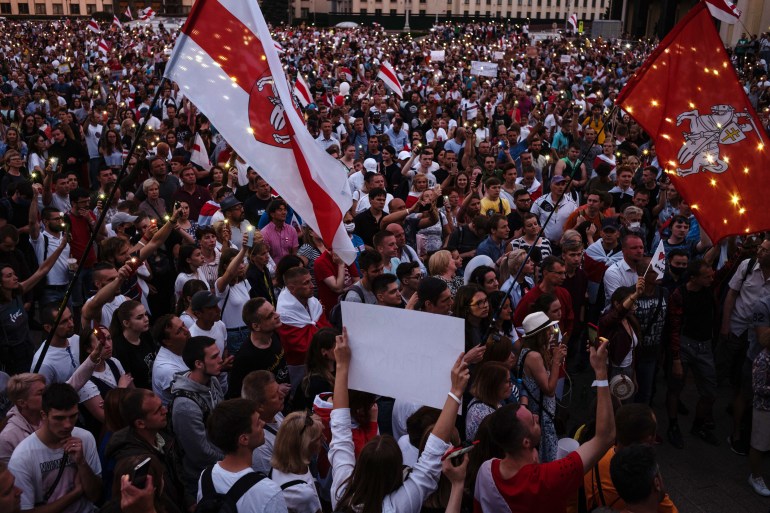
When Belarusian President Aleksandr Lukashenko won a sixth term in office in an election widely regarded as rigged in August 2020, a violent crackdown on peaceful protesters ensued. As a result, tens of thousands of Belarusians – seeking refuge from an unprecedented campaign of mass arrests and state-sponsored violence – fled to nearby countries, including Lithuania, Latvia, Georgia, Poland and Russia. Ukraine also became a common refuge for Belarusians in exile.
But when Russia launched its invasion of Ukraine, many of those who had found a new home in this neighbouring country were displaced once again and, as the Lukashenko regime became Putin’s number one ally, they sprang into action.
‘My heart was bursting’
Forty hours after Russia invaded Ukraine, Marina stood outside the train station in Przemyśl, Poland, just 14km (8.7 miles) from the Ukrainian border. She was waiting for her friend Dina, 34, another Belarusian dissident who had been living in Ukraine, to pass through customs.
Practically overnight, Przemyśl, one of the oldest cities in southeastern Poland, became a point of refuge for hundreds of thousands of Ukrainians who arrived by bus and train with their hurriedly packed bags.
“My heart was bursting into pieces,” Marina says, recalling how it was unbearable to overhear snippets of conversations revealing lives ripped apart by the war.
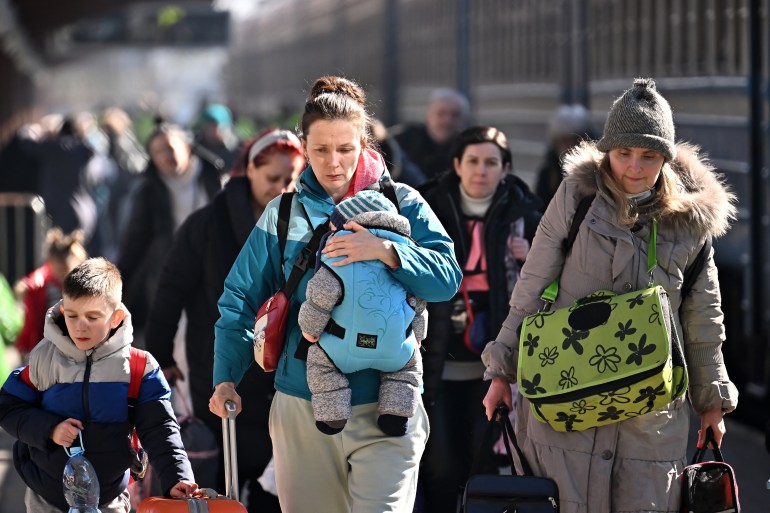
Marina is all too familiar with the pain of leaving one’s home and family behind. After taking part in the pro-democracy movement in Belarus, during and after the August 2020 election, Marina was arrested twice and threatened by the Belarusian KGB. In detention, she was beaten and denied food and water for days.
When she was released in August 2021, she fled to Ukraine with her husband, leaving her elderly mother behind. “We miss each other and we understand there’s a possibility I will never see her again,” Marina says.
After Dina passed through customs, Marina took her home to get some rest. In the following days, as the war intensified, and more than three million Ukrainians hurried to escape the Russian bombs and artillery fire, Marina joined the pool of volunteers, translating, sorting humanitarian aid, and coordinating refugees at the Przemyśl and Kraków train stations. As she talked to people and looked at their exhausted faces she couldn’t shake off the feeling it could have been her in their place.
“I’m trying to help where I can,” Marina says.
She is not the only one. Several non-profit organisations operated by the Belarusian diaspora are providing humanitarian aid to Ukraine.
Seen as the ‘aggressors’
When the invasion started, the Lithuania-based non-profit organisation Belarus Solidarity Foundation (BySol), which was founded in 2020 to help those fleeing persecution in Belarus, focused specifically on helping evacuate Belarusian political refugees from Ukraine.
“They were very vulnerable,” says Andrej Stryzhak, the head of the organisation. “The Russian attack was coming from Belarus and suddenly they [Belarusians] were seen [by Ukrainians] as the aggressors.”
A 37-year-old Belarusian human rights activist, Stryzhak co-founded BySol together with two IT entrepreneurs and activists from Belarus after he fled the country in July 2020. Stryzhak says he was arrested multiple times in Belarus after launching a crowdfunding initiative aimed at distributing PPE and medical equipment to hospitals during the COVID crisis. Lukashenko had referred to the pandemic as a “psychosis” and Stryzhak feels he was targeted because his initiative exposed the government’s mishandling of the crisis.
After the Russian invasion of Ukraine, the Foundation quickly broadened its operations, launching a crowdfunding campaign which has so far raised over 65,000 euros ($72,000) to send humanitarian aid to Ukraine. The efforts are not only humanitarian. The organisation also launched a Telegram channel to provide information for those who want to leave Russia, Belarus and Ukraine, and a campaign to raise funds for Belarusian volunteers who are joining the Ukrainian army.
‘Ukraine has given me a new home’
According to Hanna Liubakova, a Belarusian journalist and fellow at the Atlantic Council, an American think tank, at least several hundred Belarusians have joined the Ukrainian Army and Territorial Defense Forces in Ukraine, either forming their own battalions or fighting alongside Ukrainians in Kyiv, Odesa, Lviv, and elsewhere.
Gerard, a 35-year-old Belarusian who asked not to give his real name in order to protect his family back in Belarus, is now getting ready to defend Kyiv as a soldier in the Kastus Kalinouski Battalion formed by Belarusian volunteers in Ukraine.
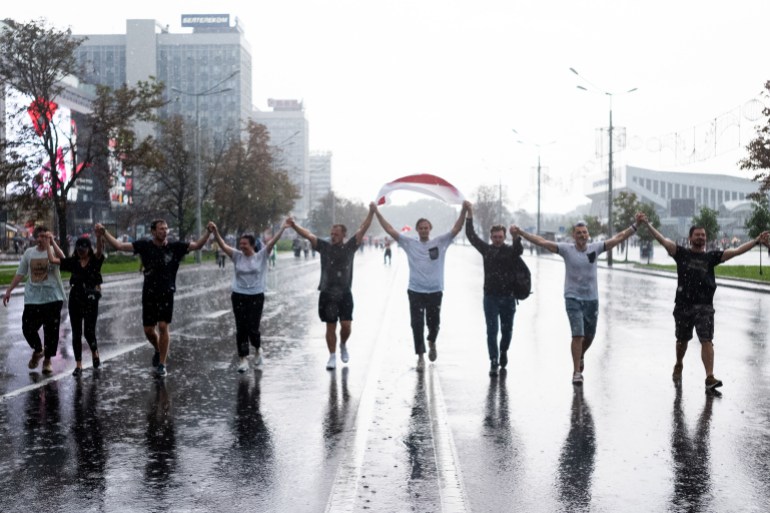
Originally from Minsk, Gerard left Belarus in the aftermath of the mass arrests in August 2020, and lived in Irpin’, not far from Kyiv, before the war.
“Lukashenko’s regime took everything from me,” says Gerard, explaining how he was persecuted and arrested in Belarus. “Ukraine has given me a new home, a new job, and a really good life.”
Gerard is currently undergoing military training in the battalion alongside other volunteers. Although worried about what is to come, he is resolute in his decision to fight for Ukraine. “I have to protect what is mine,” he says.
Cyberattacks
Inside Belarus, a group of hackers who call themselves Cyberpartisans has taken responsibility for cyberattacks aimed at sabotaging Belarus’ involvement in the war.
In January, after Russia began moving troops into Belarus and as the invasion of Ukraine was looming, the group claimed to have hacked the Belarusian railway system in an attempt to slow down the deployment of Russian troops in the country and obtain the release of Belarusian political prisoners.
A month later, two days after Moscow invaded Ukraine, the hacking team said they had hit Belarus’ train network again, bringing down the online ticketing website and possibly compromising the switching and routing systems. Once again, they said their goal was to delay the advance of Russian troops.
“Many [Belarusians] feel a sense of disconnect, many have family there [in Ukraine], they perceive Ukrainians as their brothers and sisters,” says Liubakova. “They want to protect Ukraine.”
‘The weaker Putin is, the weaker Lukashenko is’
The outcome of this invasion could also have consequences for Belarus. A Russian defeat in Ukraine could threaten the Belarusian regime as Lukashenko has become increasingly dependent on Moscow in the last year and a half.
As the US and EU imposed a series of sanctions on the Belarusian regime following the violent crackdown on civilians in August 2020, Russian President Vladimir Putin stepped in, offering Lukashenko funds and security forces.
But Putin’s help did not come cheap. Lukashenko allowed Moscow to deploy thousands of troops to Belarus, using the country as a springboard for the invasion of Ukraine.
“The weaker Putin is, the weaker Lukashenko is,” Liubakova explains.

On the other hand, the journalist believes a prolonged occupation could also strengthen Russia’s influence over Belarus. “It could lead to [the] further presence of Russia in Belarus and to the loss of our independence,” she says.
Belarus represents a strategic asset for Putin’s ambitions, as it borders Poland, Lithuania and Latvia, three countries that are now NATO members but used to be under the Soviet sphere of influence – Lithuania and Latvia were part of the Soviet bloc while Poland was a satellite state.
“We already see signs of military occupation in our country,” Liubakova continues. If Ukraine falls, Russian troops could remain in Belarus indefinitely. “They might stay and take full control of the military and the Kremlin could even establish administrative control over Belarus,” she says.
‘I’m afraid of speaking Russian in the streets’
While Lukashenko has denied that he plans to send Belarusian troops to the front line, Belarus is among the few nations – together with North Korea, Eritrea and Syria – that voted against the UN resolution condemning the invasion.
“Ukrainians will now think we’re bad people,” says Marina, voicing a fear shared by many Belarusians. Since the invasion, anti-Russian and anti-Belarusian sentiments have been brewing in some countries and some Belarusians say they have been denied entrance to bars and shops because of their nationality.
“I was very positive when I came here, then this war started and it all has changed,” says a Belarusian who took part in the 2020 protests and recently fled to Georgia. Fearing retaliation from the Belarusian regime, she asked not to give her name. “I’m afraid of speaking Russian in the streets, I mostly stay inside.” She says she was recently denied a room on Airbnb when the owner wrote that he does not accept Russians or Belarusians.
When confronted with this anti-Belarusian sentiment, it can often be hard to explain the difference between the position of the Belarusian authorities and the people. But one Belarusian who asked to stay anonymous for fear of retaliation, explains: “If we’re here, it’s because we fled our regime.”
“We have to distinguish between the people and the regime,” says Liubakova. “There is a widespread understanding among Belarusians that we cannot fight against Ukrainians, it’s a neighbouring country, people do not want this war.”
‘We are in the same boat’
On February 27 – the same day a referendum was held in Belarus that approved constitutional reforms allowing Lukashenko to stay in power until 2035, granting him immunity from prosecution once he leaves office and permitting the country to host nuclear weapons – more than 800 Belarusians were arrested while protesting against the war in Ukraine. These protests were a desperate act of defiance. In the last year and a half, the regime has arrested more than 35,000 Belarusians in an effort to suppress the country’s pro-democracy movement. Thousands have been brutally beaten and tortured.
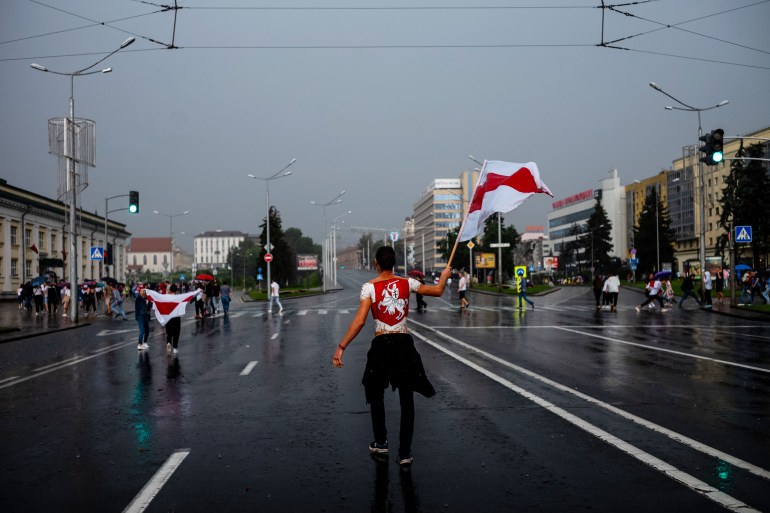
Since those fleeing have used different types of visas and have different statuses in the countries they have fled to, it is not possible to know the exact number of Belarusians who have left. But the systematic nature of the forced departures has led a network of human rights lawyers and organisations to submit a case against the Lukashenko regime to the International Criminal Court (ICC), for the crimes against humanity of forced deportation and persecution.
Marina says that some days she struggles to gather the strength to read the news or leave her apartment. But she knows she must. “If I give in to despair, I will be like that wounded soldier, who is unable to do anything,” she says.
“So I will go to that volunteer centre and I will sort through the humanitarian aid, trying not to make mistakes, even though Belarusians are often told to join ‘the Russian warship’, [a reference to the Ukrainian border guards on Snake Island who told a Russian warship to ‘go f**k themselves’]. It hurts, but I have come to a conclusion that we are in the same boat, and we have one enemy.”
This reporting was supported by the International Women’s Media Foundation’s Howard G. Buffett Fund for Women Journalists and Journalismfund.eu.


